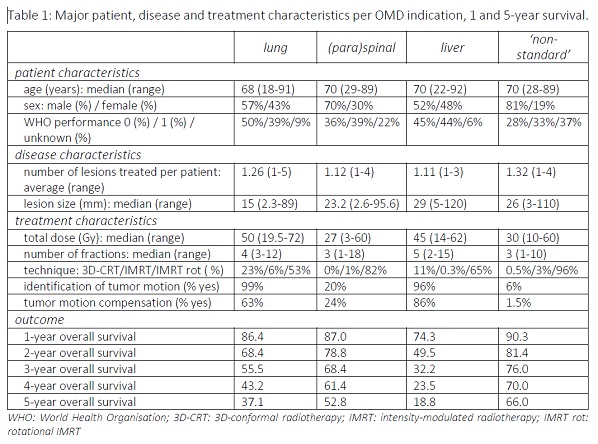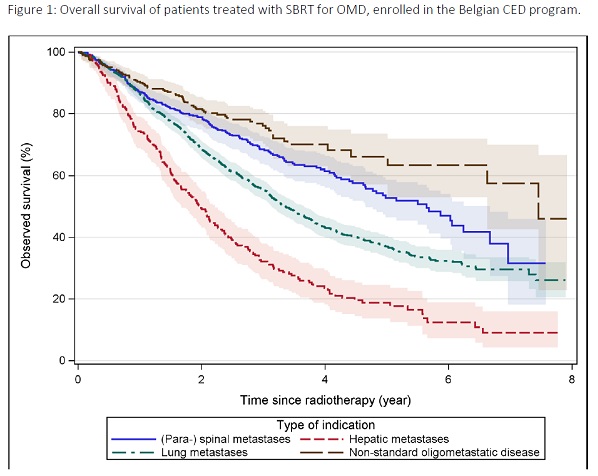SBRT for oligo-metastatic disease in Belgium: a prospective national registration project.
OC-0600
Abstract
SBRT for oligo-metastatic disease in Belgium: a prospective national registration project.
Authors: Yolande Lievens1, Leen Boesmans2, Hilde Engels3, Nicolas Jansen4, Sharon Janssens2, Vincent Remouchamps5, Sander Roosens3, Karin Stellamans6, Dirk Verellen7, Nancy Van Damme2
1Ghent University Hospital and Ghent University, Radiation Oncology Department, Ghent, Belgium; 2Belgian Cancer Registry, NA, Brussels, Belgium; 3Belgian National Institute for Health and Disability Insurance, NA, Brussels, Belgium; 4CHU de Liège, Radiation Oncology Department, Liège, Belgium; 5CHU UCL Namur, Site Sainte Elisabeth, Radiation Oncology Department, Namur, Belgium; 6AZ Groeninge, Radiation Oncology Department, Kortrijk, Belgium; 7Iridium Netwerk, Antwerp University, Radiation Oncology and Faculty of Medicine and Health Sciences, Antwerp, Belgium
Show Affiliations
Hide Affiliations
Purpose or Objective
Stereotactic body radiotherapy (SBRT) has rapidly gained acceptance in the radical treatment of oligometastatic disease (OMD), even if prospective evidence from clinical trials remains scarce and results from randomized phase III trials are still awaited. Patterns-of-care and survival of patients undergoing SBRT for OMD in the context of a coverage with evidence development (CED) program in Belgium are reported.
Material and Methods
As of 2013, Belgian radiation oncology centers delivering SBRT were invited to participate in the prospective 'Innovative Radiotherapy Techniques' registration project, an initiative of the Belgian National Institute for Health and Disability Insurance (NIHDI), in exchange for temporary research funding. Eligible patients belonged to pre-determined target groups receiving SBRT for a primary tumor or for OMD, defined as a maximum of 3 metastatic lesions. ‘Standard’ vs. ‘non-standard’ indications were defined, the latter requiring enrollment in a formal clinical trial to be eligible for registration and financing. Real-life data on patient, disease and treatment characteristics were recorded in a registration module, available as an online application of the Belgian Cancer Registry. Survival was obtained through August 9th, 2021.
Results
Between 10/2013 and 12/2019, a total of 6,296 SBRT courses were registered in 20 of the 25 radiotherapy centers in Belgium, courses per center ranging between 21 and 951. After data cleaning, 5,675 courses concerning 4,841 patients were available for analysis. Of these, 2,790 pertained to OMD, with 1,484 (53%) being ‘standard’ lung metastases, 537 (19%) (para)spinal and 327 (12%) liver metastases. The ‘non-standard OMD’ group included the remaining 442 (16%) courses, with a dominance of lymph node (n=165, 37%) and non-spinal bone (n=248, 56%) metastases. Patients typically had a good performance status and most frequently only one metastatic lesion. Total dose, fractionation and techniques varied, but higher total doses and techniques evaluating/compensating tumor motion were more frequently used for lung and liver metastases than for the other indications. Overall survival was highest in case of ‘non-standard’ metastases, mostly pertaining to patients with primary prostate cancer, whereas liver metastases did worst. Major patient, disease and treatment characteristics, and survival, are shown in table 1; Kaplan-Meyer survival curves in Figure 1.


Conclusion
This national CED program prospectively evaluated SBRT implementation across Belgium. It shows that patients treated for OMD in the Belgian clinical practice were carefully selected. While variable, treatment characteristics and survival data conform to those previously reported in the literature. Together with data collection in ongoing clinical trials and other prospective cohorts such as OligoCare, these data allow to better understand and define the role of metastasis-directed radiotherapy in different OMD indications.